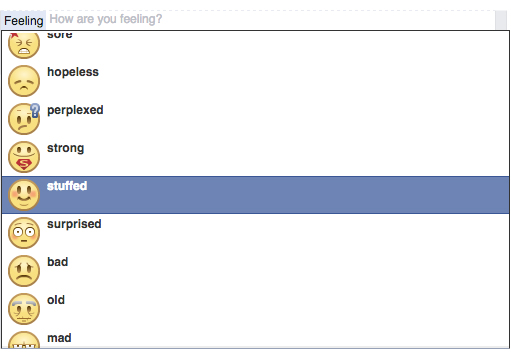
Facebook’s ‘fat’ emotion was changed to ‘stuffed’ after an online campaign against the word.
Credit: Screenshot of Facebook
Anxious. Blissful. Confused. Disappointed. Enraged. Fat. All of these are emotions but the last word.
Among Facebook’s expansion of techniques is a feature that allows users to post emoticons, small icons that represent certain moods, to their statuses. Until March 10, the emoticon’s feelings category consisted of a mood called “feeling fat” alongside a character with a double chin. But this was put to end after Facebook received much pressure from the “Fat is Not a Feeling” campaign, hosted by an organization called Endangered Bodies.
Unlike Jamaica and south African countries, American culture does not glorify plumpness. People are often bullied for not meeting America’s super-slim standard of beauty. For example, though the average waist size of American women is 14, magazines overwhelmingly feature models whose waist sizes reside in the lower, single digits. Many overweight people are even tormented with words like “pig” and “fat” from their peers on Facebook and other social media sites. This constant harassment is what can make it very difficult for a larger person to embrace their appearance in a society that deplores it. It is for this reason that I support Facebook’s recent alteration of the mood “feeling fat” to “feeling stuffed”.
The effects of oppressing overweight people can be even more detrimental to their health than the bullying itself. Being deemed “fat” by peers, in addition to non-supportive media, is what usually causes people to have distorted self-images, which often lead to unhealthy behaviors like eating disorders. In their place, I could not imagine having friends who are noticeably slimmer than me post that an extra french fry is making them “feel fat”.
There is no doubt that America is an ever-changing country. Popular clothing from twenty years ago is not popular now. The English language is known for being one of the hardest to learn because of new slang that often rises and fades away. Using the term “fat” as a feeling may very well be a part of American language evolving. But evolving language is never a means to offend a marginalized group of people.
Telling people to minimize their sensitivity on the usage of the word fat because America’s language is changing will not stop them from hurting. Just as continuing to use “feeling fat” to express overeating once will not change the likeliness that the person making the statement is not overweight at all.
There is no law that limits language. This is America where Freedom of Speech always presides first. But as a human being, my conscious trumps the use of any free-willed statement or word that has an abundant outcry against it.


